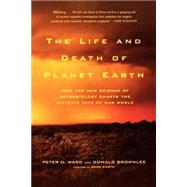The Life and Death of Planet Earth How the New Science of Astrobiology Charts the Ultimate Fate of Our World
, by Ward, Peter D.; Brownlee, Donald- ISBN: 9780805075120 | 0805075127
- Cover: Paperback
- Copyright: 1/1/2004
"They deftly bring together findings from many disparate areas of science in a book that science buffs will find hard to put down." Publishers Weekly Science has worked hard to piece together the story of the evolution of our world up to this point, but only recently have we developed the understanding and the tools to describe the entire life cycle of our planet. Peter D. Ward and Donald Brownlee, a geologist and an astronomer respectively, are in the vanguard of the new field of astrobiology. Combining their knowledge of how the critical sustaining systems of our planet evolve through time with their understanding of how stars and solar systems grow and change throughout their own life cycles, the authors tell the story of the second half of Earth's life. In this masterful melding of groundbreaking research and captivating, eloquent science writing, Ward and Brownlee provide a comprehensive portrait of Earth's life cycle that allows us to understand and appreciate how the planet sustains itself today, and offers us a glimpse of our place in the cosmic order. Peter Ward,along with Don Brownlee, is the author of the acclaimed and bestsellingRare Earth. Ward is a professor of geological science and zoology at the University of Washington and the author of nine other books, includingFuture Evolution, The Call of Distant Mammoths, andThe End of Evolution, which was a finalist for theLos Angeles TimesBook Prize. Don Brownleeis a professor of astronomy at the University of Washington; currently he is leading NASA'sStardustmission. Imagine our planet far into the future, Carl Sagan's "pale blue dot" reduced to a reddish-brown husk, a mere shell of its former self. It seems like the stuff of science fiction novels, but it is the reality of science today. We are at a unique moment in our historyEarth's midlifea point at which science has given us the capability to examine the birth of our planet as well as the forces that will bring about its eventual death. Scientists are finally beginning to understand the cycles that make Earth work and to write, for the first time, a biography of our planet. This revolution in thinking, which finds its voice in this book, is as dramatic, in its own way, as the discovery of Earth revolving around the sun. Peter D. Ward and Donald Brownleea paleontologist and an astronomer, respectivelyare helping to bring this groundbreaking work to a popular audience. Vanguards of a new field called astrobiology (the science of how planets and organisms live and die), Ward and Brownlee combine the discoveries of astronomers, Earth scientists, and those in other scientific disciplines. Astronomers are well-poised to study the end of our world, since they have studied the end of other worlds, while paleontologists can tell us about "worlds" that have already ended on our planet, such as the death of dinosaurs and other signposts in the rock and fossil record. Ward and Brownlee present a comprehensive portrait of Earth's ultimate fate, allowing us to understand and appreciate how our planet sustains itself, and offer a glimpse at our place in the cosmic order. As they depict the process of planetary evolution, they peer deep into the future destiny of Earth, showing us that we are living near or shortly after Earth's biological peak. Eventually, the process of planetary evolution will reverse itself; life as we know it will subside until only the simplest forms remain. In time they, too, will disappear. The oceans will evaporate, the atmosphere will degrade, and as the sun slowly expands, Earth will eventually meet a fiery end. Combining groundbreaking research with lucid, eloquent writing, this book offers fresh and realistic insight into the true nature if our world and how we should be







